外研版(2019)必修 第一册Unit 3 Family matters Developing ideas 语言点课件(共29张PPT)
文档属性
| 名称 | 外研版(2019)必修 第一册Unit 3 Family matters Developing ideas 语言点课件(共29张PPT) |  | |
| 格式 | pptx | ||
| 文件大小 | 2.2MB | ||
| 资源类型 | 教案 | ||
| 版本资源 | 外研版(2019) | ||
| 科目 | 英语 | ||
| 更新时间 | 2024-10-10 16:48:00 | ||
图片预览

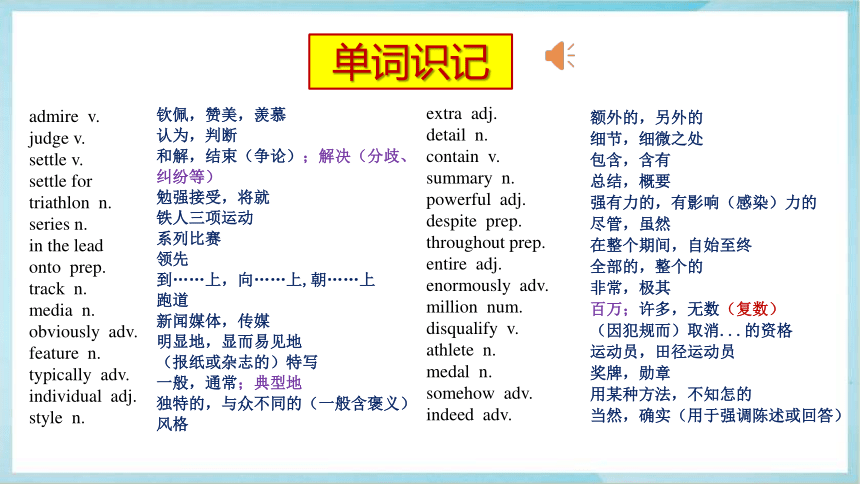
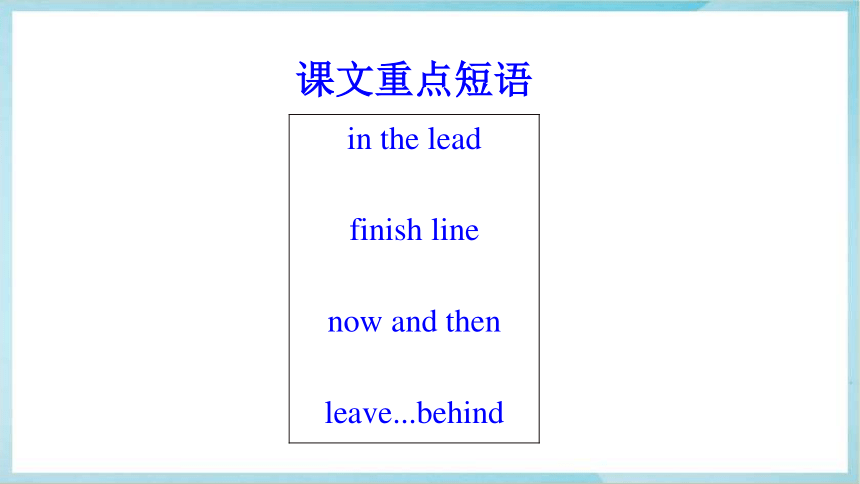
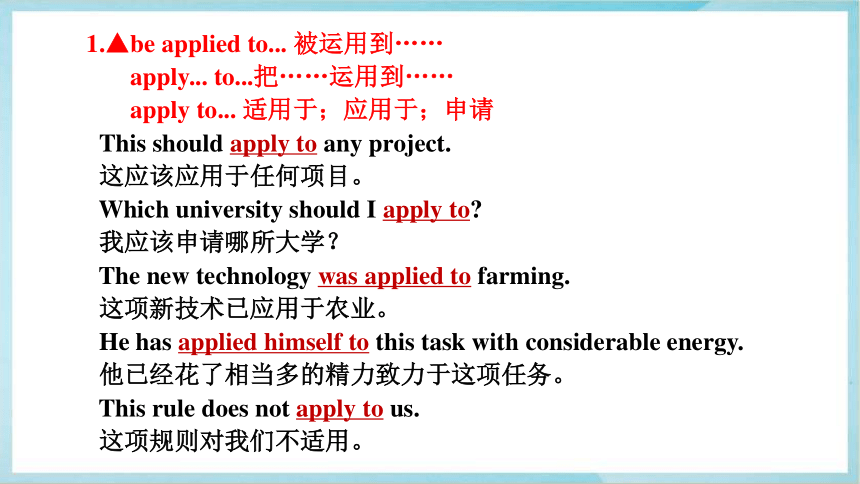
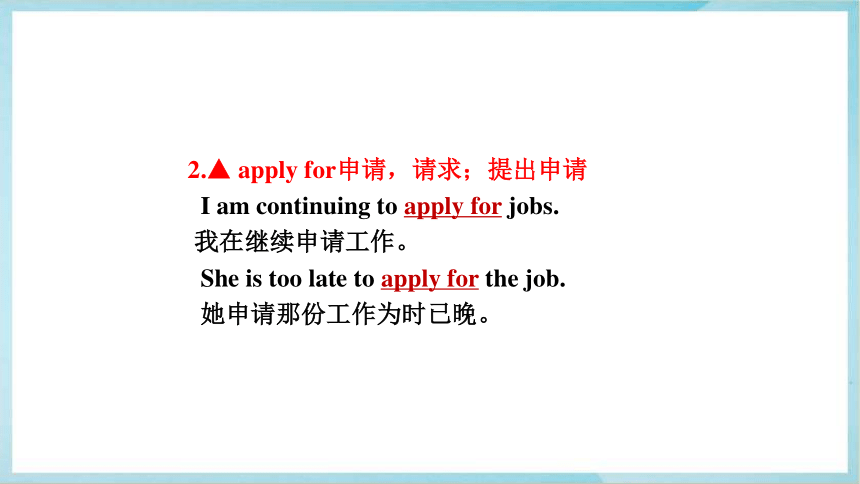

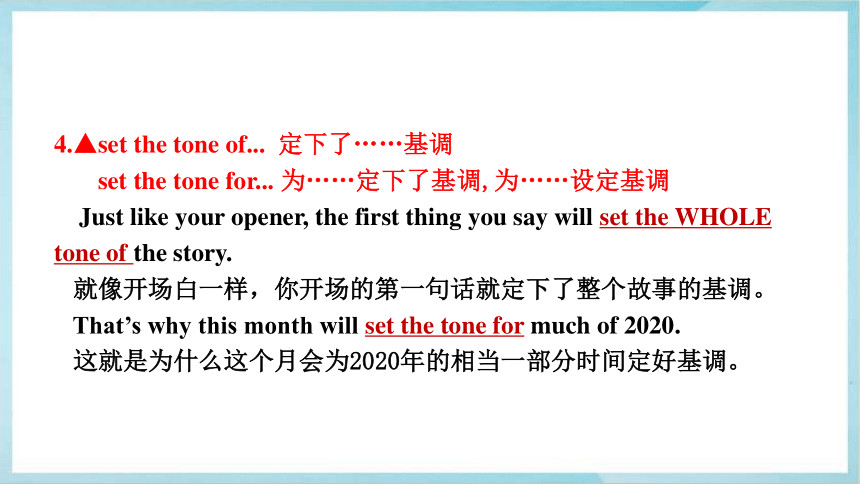
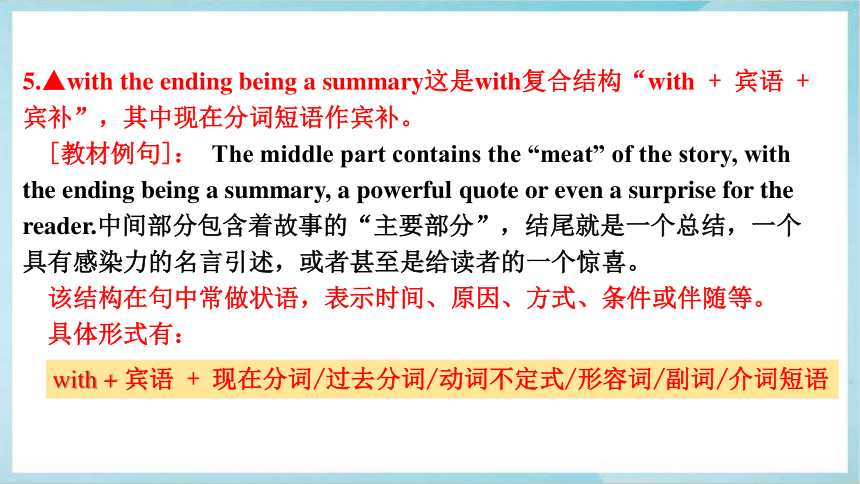
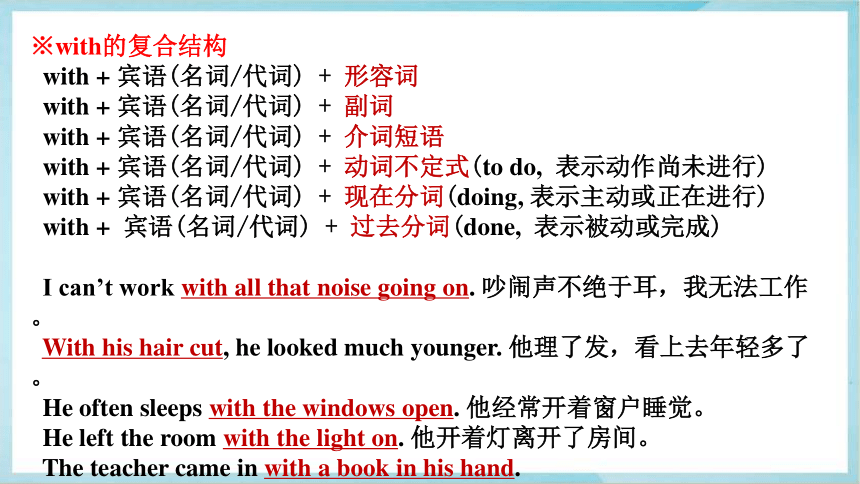
文档简介
(共29张PPT)
Unit 3 Developing ideas
JUST A BROTHER
只是一位兄长
语言点课件
admire v.
judge v.
settle v.
settle for
triathlon n.
series n.
in the lead
onto prep.
track n.
media n.
obviously adv.
feature n.
typically adv.
individual adj.
style n.
extra adj.
detail n.
contain v.
summary n.
powerful adj.
despite prep.
throughout prep.
entire adj.
enormously adv.
million num.
disqualify v.
athlete n.
medal n.
somehow adv.
indeed adv.
钦佩,赞美,羡慕
认为,判断
和解,结束(争论);解决(分歧、纠纷等)
勉强接受,将就
铁人三项运动
系列比赛
领先
到……上,向……上,朝……上
跑道
新闻媒体,传媒
明显地,显而易见地
(报纸或杂志的)特写
一般,通常;典型地
独特的,与众不同的(一般含褒义)
风格
额外的,另外的
细节,细微之处
包含,含有
总结,概要
强有力的,有影响(感染)力的
尽管,虽然
在整个期间,自始至终
全部的,整个的
非常,极其
百万;许多,无数(复数)
(因犯规而)取消...的资格
运动员,田径运动员
奖牌,勋章
用某种方法,不知怎的
当然,确实(用于强调陈述或回答)
单词识记
课文重点短语
in the lead
finish line
now and then
leave...behind
1.▲be applied to... 被运用到……
apply... to...把……运用到……
apply to... 适用于;应用于;申请
This should apply to any project.
这应该应用于任何项目。
Which university should I apply to
我应该申请哪所大学?
The new technology was applied to farming.
这项新技术已应用于农业。
He has applied himself to this task with considerable energy.
他已经花了相当多的精力致力于这项任务。
This rule does not apply to us.
这项规则对我们不适用。
2.▲ apply for申请,请求;提出申请
I am continuing to apply for jobs.
我在继续申请工作。
She is too late to apply for the job.
她申请那份工作为时已晚。
3.▲settle for 勉强接受,将就,勉强同意,无奈接受
In the end they had to settle for a draw(平局).
最后他们只好接受平局的结果。
I couldn’t afford the house I really wanted, so I had to settle for second best.
我真心想要的房子我买不起,所以只得退而求其次了。
Does anyone think that China will settle for anything less
有人会认为中国会将满足于次等的低位?
4.▲set the tone of... 定下了……基调
set the tone for... 为……定下了基调,为……设定基调
Just like your opener, the first thing you say will set the WHOLE tone of the story.
就像开场白一样,你开场的第一句话就定下了整个故事的基调。
That’s why this month will set the tone for much of 2020.
这就是为什么这个月会为2020年的相当一部分时间定好基调。
5.▲with the ending being a summary这是with复合结构“with + 宾语 + 宾补”,其中现在分词短语作宾补。
[教材例句]: The middle part contains the “meat” of the story, with the ending being a summary, a powerful quote or even a surprise for the reader.中间部分包含着故事的“主要部分”,结尾就是一个总结,一个具有感染力的名言引述,或者甚至是给读者的一个惊喜。
该结构在句中常做状语,表示时间、原因、方式、条件或伴随等。
具体形式有:
with + 宾语 + 现在分词/过去分词/动词不定式/形容词/副词/介词短语
※with的复合结构
with + 宾语(名词/代词) + 形容词
with + 宾语(名词/代词) + 副词
with + 宾语(名词/代词) + 介词短语
with + 宾语(名词/代词) + 动词不定式(to do, 表示动作尚未进行)
with + 宾语(名词/代词) + 现在分词(doing, 表示主动或正在进行)
with + 宾语(名词/代词) + 过去分词(done, 表示被动或完成)
I can’t work with all that noise going on. 吵闹声不绝于耳,我无法工作。
With his hair cut, he looked much younger. 他理了发,看上去年轻多了。
He often sleeps with the windows open. 他经常开着窗户睡觉。
He left the room with the light on. 他开着灯离开了房间。
The teacher came in with a book in his hand.
老师手里拿着一本书走了进来。
6.▲with just 700 metres to go距终点还有700米
with + 宾语 + 动词不定式短语作定语 是介词短语结构。
这里的to go 是动词不定式做定语,表示要做的动作。
With a lot of work to do, he had to return to his office.
有这么多工作要做,他不得不回到办公室。
With much homework to do, I had to spend another hour on our lessons.
有这么多家庭作业要做,我还得在课程上多花一个小时。
7.▲in third place=in the third place 第三名
He finished in third place.他得了第三名。
The Spanish, in third place, are the coolest Europeans.
排行第三的西班牙人是最酷的欧洲人。
Food shopping came in third place.食品采购排在第三位。
8.▲in the lead领先,在前头;占主导地位的
The Democrats now appear to be in the lead.
现在看来好像民主党人占优势。
The two boys entered the hole, Tom in the lead.
这两个男孩进了洞,汤姆走在前面。
9.▲the finish line终点线 the starting line 起跑线
Three horses crossed the finish line together.三匹马同时冲过终点线。
And in the long run, who will be the last ones standing at the finish line
在这场漫长的赛跑中,究竟谁是最后那些站在终点线上的人呢?
They were all waiting on the starting line.他们全都在起跑线上等待。
Self-driving is an area where China and the rest of the world are on the same
starting line. 在自动驾驶领域,中国和世界其他国家处于同一起跑线。
Everyone starts from the same starting line. 每个人都从同一个起跑线开始。
10.▲in the burning heat在酷热的天气中
The farmers are working in the filed in the burning heat.
农民们在酷热的天气中在田野里辛勤劳作。
Several of them keeled over in the heat.
他们中有好几个人在酷暑中倒下。《牛津词典》
11.▲as he came round the corner就在他转过弯道时
as引导的时间状语从句
As I was walking down the street I noticed a police car.
我沿街走过来的时候,看到一辆警车。
He sat watching her as she got ready.
他一直坐着看着她准备停当。
12.▲in trouble处于困境中,有麻烦;处于不幸中
It’s too bad of him to desert his wife in trouble.
他在他妻子困难的时候抛弃她,真是太差劲了。
I’ve been in trouble since I was eleven years of age.
我从11岁以后一直处于麻烦中。
13.▲who had been rushed to the medical area被紧急送到医疗区的。 这里的who引导的是非限制性定语从句,修饰前面的先行词younger brother。
Mr. Zhang, who came to see me yesterday, is an old friend of my father’s.
张先生昨天来看我,他是我父亲的一位老朋友。
Tom’s father, who is over sixty, still works hard day and night.
汤姆的父亲已经六十多岁了,他仍然从早到晚努力工作着。
My father, who is an excellent violinist, is giving a concert next month.
我爸爸下个月准备开一场音乐会,他是一名出色的小提琴手。
14.▲have been doing是现在完成进行时,表示动作从过去某一时间开始一直延续到现在且可能继续下去。
What have you been doing all the day
这一整天你一直都在做什么?
I have been fixing the fridge all the morning.
我一上午都在修理电冰箱。
I have been learning German since five years ago.
五年来我一直在学德语。
15.▲despite prep. 尽管(如此),虽然,不管 =in spite of
Despite the fact that...尽管事实是...
Despite his cries, no one came to his assistance.
尽管他喊叫,却没有人来帮助他。
People were swimming in the ocean despite the hurricane warning.
尽管有飓风警报,人们仍然在大海里游泳。
16.▲now and then 有时,偶尔,不时
类似的:(every) now and then/again
from time to time
once in a while
sometimes
occasionally
at times
My grandfather still plays tennis now and then, even though he’s in his nineties.我的祖父尽管九十多岁了,仍然偶尔打打网球。
Every now and then he regretted his decision.他有时为自己的决定后悔。
He can work hard but he needs a nudge now and then.
他能努力工作,但偶尔需要督促一下。
You need to lift your head every now and then when you’re reading, which is good for your eyes.
阅读时,你应该偶尔抬头,这对你的眼睛有好处。
17.▲everything (that) I do我所做的一切 这里的I do 是定语从句,修饰everything。当先行词是不定代词时,经常用that引导定语从句,如:
There is not much that ought to be done right now.
没有多少应该立刻就做的事情。
I did nothing that might hurt you.我一点也没有做可能伤害你的事。
I have done all the work that he told me to do.
我已经把他让我干的活全部干完了。
18.▲Watched by millions 有数百万人目睹了... 这儿是过去分词短语作原因状语。如:
Seriously injured, he had to be taken to hospital.
由于伤势严重,只好把他送往医院。
Bitten by the snake in the bush, Susan was sent back to the camp.
由于被灌木丛中的蛇咬到,苏珊被送回到了露营地。
The child behaves well, well brought up by his parents.
由于受到父母良好教育,这个孩子规矩有礼貌。
19.▲Mum wouldn’t have been happy if I’d left Jonny behind. 要是我撇下乔尼,妈妈肯定会不高兴的。本句使用了与过去事实相反的虚拟语气。
If从句谓语用“had + 过去分词”,主句用“would + not + have + 过去分词”。表示假设过去某种情况发生的话,会导致什么样的后果。
If you had worked hard, you would have easily passed the final examination.如果你当时努力学习的话,就会轻松通过期末考试的。
If the thief hadn’t looked around, the policeman wouldn’t have caught him.
如果这个小偷不到处观望的话,警察不会抓住他的。
20.▲aim for...瞄准;以...为目标;针对;力争
I aim for being better than yesterday, not as good as tomorrow.
我的目标就是比昨天做得更好,而不是明天。
If you aim for the stars, you will give yourself the opportunity to touch the sky, and maybe the moon. 如果你的目标是摘星星,那么就给自己一个触摸天空或是月亮的机会吧。
To be able to get what you want, you have to aim for it.
你只要瞄准你想要的,你才能得到它。
Unit 3 Developing ideas
JUST A BROTHER
只是一位兄长
语言点课件
admire v.
judge v.
settle v.
settle for
triathlon n.
series n.
in the lead
onto prep.
track n.
media n.
obviously adv.
feature n.
typically adv.
individual adj.
style n.
extra adj.
detail n.
contain v.
summary n.
powerful adj.
despite prep.
throughout prep.
entire adj.
enormously adv.
million num.
disqualify v.
athlete n.
medal n.
somehow adv.
indeed adv.
钦佩,赞美,羡慕
认为,判断
和解,结束(争论);解决(分歧、纠纷等)
勉强接受,将就
铁人三项运动
系列比赛
领先
到……上,向……上,朝……上
跑道
新闻媒体,传媒
明显地,显而易见地
(报纸或杂志的)特写
一般,通常;典型地
独特的,与众不同的(一般含褒义)
风格
额外的,另外的
细节,细微之处
包含,含有
总结,概要
强有力的,有影响(感染)力的
尽管,虽然
在整个期间,自始至终
全部的,整个的
非常,极其
百万;许多,无数(复数)
(因犯规而)取消...的资格
运动员,田径运动员
奖牌,勋章
用某种方法,不知怎的
当然,确实(用于强调陈述或回答)
单词识记
课文重点短语
in the lead
finish line
now and then
leave...behind
1.▲be applied to... 被运用到……
apply... to...把……运用到……
apply to... 适用于;应用于;申请
This should apply to any project.
这应该应用于任何项目。
Which university should I apply to
我应该申请哪所大学?
The new technology was applied to farming.
这项新技术已应用于农业。
He has applied himself to this task with considerable energy.
他已经花了相当多的精力致力于这项任务。
This rule does not apply to us.
这项规则对我们不适用。
2.▲ apply for申请,请求;提出申请
I am continuing to apply for jobs.
我在继续申请工作。
She is too late to apply for the job.
她申请那份工作为时已晚。
3.▲settle for 勉强接受,将就,勉强同意,无奈接受
In the end they had to settle for a draw(平局).
最后他们只好接受平局的结果。
I couldn’t afford the house I really wanted, so I had to settle for second best.
我真心想要的房子我买不起,所以只得退而求其次了。
Does anyone think that China will settle for anything less
有人会认为中国会将满足于次等的低位?
4.▲set the tone of... 定下了……基调
set the tone for... 为……定下了基调,为……设定基调
Just like your opener, the first thing you say will set the WHOLE tone of the story.
就像开场白一样,你开场的第一句话就定下了整个故事的基调。
That’s why this month will set the tone for much of 2020.
这就是为什么这个月会为2020年的相当一部分时间定好基调。
5.▲with the ending being a summary这是with复合结构“with + 宾语 + 宾补”,其中现在分词短语作宾补。
[教材例句]: The middle part contains the “meat” of the story, with the ending being a summary, a powerful quote or even a surprise for the reader.中间部分包含着故事的“主要部分”,结尾就是一个总结,一个具有感染力的名言引述,或者甚至是给读者的一个惊喜。
该结构在句中常做状语,表示时间、原因、方式、条件或伴随等。
具体形式有:
with + 宾语 + 现在分词/过去分词/动词不定式/形容词/副词/介词短语
※with的复合结构
with + 宾语(名词/代词) + 形容词
with + 宾语(名词/代词) + 副词
with + 宾语(名词/代词) + 介词短语
with + 宾语(名词/代词) + 动词不定式(to do, 表示动作尚未进行)
with + 宾语(名词/代词) + 现在分词(doing, 表示主动或正在进行)
with + 宾语(名词/代词) + 过去分词(done, 表示被动或完成)
I can’t work with all that noise going on. 吵闹声不绝于耳,我无法工作。
With his hair cut, he looked much younger. 他理了发,看上去年轻多了。
He often sleeps with the windows open. 他经常开着窗户睡觉。
He left the room with the light on. 他开着灯离开了房间。
The teacher came in with a book in his hand.
老师手里拿着一本书走了进来。
6.▲with just 700 metres to go距终点还有700米
with + 宾语 + 动词不定式短语作定语 是介词短语结构。
这里的to go 是动词不定式做定语,表示要做的动作。
With a lot of work to do, he had to return to his office.
有这么多工作要做,他不得不回到办公室。
With much homework to do, I had to spend another hour on our lessons.
有这么多家庭作业要做,我还得在课程上多花一个小时。
7.▲in third place=in the third place 第三名
He finished in third place.他得了第三名。
The Spanish, in third place, are the coolest Europeans.
排行第三的西班牙人是最酷的欧洲人。
Food shopping came in third place.食品采购排在第三位。
8.▲in the lead领先,在前头;占主导地位的
The Democrats now appear to be in the lead.
现在看来好像民主党人占优势。
The two boys entered the hole, Tom in the lead.
这两个男孩进了洞,汤姆走在前面。
9.▲the finish line终点线 the starting line 起跑线
Three horses crossed the finish line together.三匹马同时冲过终点线。
And in the long run, who will be the last ones standing at the finish line
在这场漫长的赛跑中,究竟谁是最后那些站在终点线上的人呢?
They were all waiting on the starting line.他们全都在起跑线上等待。
Self-driving is an area where China and the rest of the world are on the same
starting line. 在自动驾驶领域,中国和世界其他国家处于同一起跑线。
Everyone starts from the same starting line. 每个人都从同一个起跑线开始。
10.▲in the burning heat在酷热的天气中
The farmers are working in the filed in the burning heat.
农民们在酷热的天气中在田野里辛勤劳作。
Several of them keeled over in the heat.
他们中有好几个人在酷暑中倒下。《牛津词典》
11.▲as he came round the corner就在他转过弯道时
as引导的时间状语从句
As I was walking down the street I noticed a police car.
我沿街走过来的时候,看到一辆警车。
He sat watching her as she got ready.
他一直坐着看着她准备停当。
12.▲in trouble处于困境中,有麻烦;处于不幸中
It’s too bad of him to desert his wife in trouble.
他在他妻子困难的时候抛弃她,真是太差劲了。
I’ve been in trouble since I was eleven years of age.
我从11岁以后一直处于麻烦中。
13.▲who had been rushed to the medical area被紧急送到医疗区的。 这里的who引导的是非限制性定语从句,修饰前面的先行词younger brother。
Mr. Zhang, who came to see me yesterday, is an old friend of my father’s.
张先生昨天来看我,他是我父亲的一位老朋友。
Tom’s father, who is over sixty, still works hard day and night.
汤姆的父亲已经六十多岁了,他仍然从早到晚努力工作着。
My father, who is an excellent violinist, is giving a concert next month.
我爸爸下个月准备开一场音乐会,他是一名出色的小提琴手。
14.▲have been doing是现在完成进行时,表示动作从过去某一时间开始一直延续到现在且可能继续下去。
What have you been doing all the day
这一整天你一直都在做什么?
I have been fixing the fridge all the morning.
我一上午都在修理电冰箱。
I have been learning German since five years ago.
五年来我一直在学德语。
15.▲despite prep. 尽管(如此),虽然,不管 =in spite of
Despite the fact that...尽管事实是...
Despite his cries, no one came to his assistance.
尽管他喊叫,却没有人来帮助他。
People were swimming in the ocean despite the hurricane warning.
尽管有飓风警报,人们仍然在大海里游泳。
16.▲now and then 有时,偶尔,不时
类似的:(every) now and then/again
from time to time
once in a while
sometimes
occasionally
at times
My grandfather still plays tennis now and then, even though he’s in his nineties.我的祖父尽管九十多岁了,仍然偶尔打打网球。
Every now and then he regretted his decision.他有时为自己的决定后悔。
He can work hard but he needs a nudge now and then.
他能努力工作,但偶尔需要督促一下。
You need to lift your head every now and then when you’re reading, which is good for your eyes.
阅读时,你应该偶尔抬头,这对你的眼睛有好处。
17.▲everything (that) I do我所做的一切 这里的I do 是定语从句,修饰everything。当先行词是不定代词时,经常用that引导定语从句,如:
There is not much that ought to be done right now.
没有多少应该立刻就做的事情。
I did nothing that might hurt you.我一点也没有做可能伤害你的事。
I have done all the work that he told me to do.
我已经把他让我干的活全部干完了。
18.▲Watched by millions 有数百万人目睹了... 这儿是过去分词短语作原因状语。如:
Seriously injured, he had to be taken to hospital.
由于伤势严重,只好把他送往医院。
Bitten by the snake in the bush, Susan was sent back to the camp.
由于被灌木丛中的蛇咬到,苏珊被送回到了露营地。
The child behaves well, well brought up by his parents.
由于受到父母良好教育,这个孩子规矩有礼貌。
19.▲Mum wouldn’t have been happy if I’d left Jonny behind. 要是我撇下乔尼,妈妈肯定会不高兴的。本句使用了与过去事实相反的虚拟语气。
If从句谓语用“had + 过去分词”,主句用“would + not + have + 过去分词”。表示假设过去某种情况发生的话,会导致什么样的后果。
If you had worked hard, you would have easily passed the final examination.如果你当时努力学习的话,就会轻松通过期末考试的。
If the thief hadn’t looked around, the policeman wouldn’t have caught him.
如果这个小偷不到处观望的话,警察不会抓住他的。
20.▲aim for...瞄准;以...为目标;针对;力争
I aim for being better than yesterday, not as good as tomorrow.
我的目标就是比昨天做得更好,而不是明天。
If you aim for the stars, you will give yourself the opportunity to touch the sky, and maybe the moon. 如果你的目标是摘星星,那么就给自己一个触摸天空或是月亮的机会吧。
To be able to get what you want, you have to aim for it.
你只要瞄准你想要的,你才能得到它。
